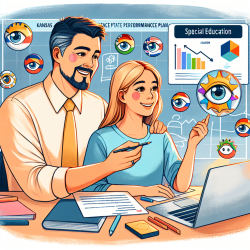Leveraging Research to Enhance Online Therapy Outcomes for Children
As professionals dedicated to the well-being and development of children, we constantly seek ways to improve our practices and outcomes. One area ripe for exploration is the application of findings from systematic reviews on interventions for people with disabilities. A recent systematic review titled "Effectiveness of interventions for improving livelihood outcomes for people with disabilities in low- and middle-income countries" provides valuable insights that can be adapted to enhance our online therapy services at TinyEYE.
Key Findings from the Systematic Review
The review, conducted by Hunt et al. (2022), analyzed various interventions aimed at improving livelihood outcomes for people with disabilities in low- and middle-income countries (LMICs). The primary focus was on interventions that improved access to employment, financial services, social protection, and skills development. Although the review's context is different, the principles can be adapted to improve our online therapy services for children.
Adapting the Findings to Online Therapy
Here are some key takeaways from the review and how they can be applied to enhance our online therapy services:
- Skills Development: The review found that vocational training and social skills training significantly improved employment outcomes. For our online therapy services, incorporating targeted skill development modules, such as communication and social interaction exercises, can be beneficial.
- Inclusive Approaches: The interventions that included both people with and without disabilities showed promising results. Creating inclusive group therapy sessions where children with different abilities interact can foster a supportive environment and improve social skills.
- Community-Based Models: Community-based rehabilitation programs were effective in improving livelihood outcomes. While our services are online, we can create virtual communities where children and their families can share experiences, resources, and support each other.
- Accessibility: Providing accessible tools and resources, such as speech-to-text software and visual aids, can enhance the effectiveness of our therapy sessions, especially for children with physical or sensory impairments.
Encouraging Further Research
While the review provides a solid foundation, it also highlights the need for more rigorous evaluations and research. As practitioners, we should not only implement these findings but also contribute to the body of knowledge by conducting our own research. Collaborating with academic institutions and participating in studies can provide valuable data to refine and improve our services.
Conclusion
Incorporating evidence-based practices into our online therapy services can significantly enhance outcomes for children. By adapting the findings from the systematic review by Hunt et al. (2022), we can create more effective, inclusive, and accessible therapy programs. Let's continue to strive for excellence and contribute to the growing body of research in this field.
To read the original research paper, please follow this link: Effectiveness of interventions for improving livelihood outcomes for people with disabilities in low- and middle-income countries: A systematic review.










